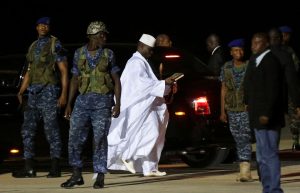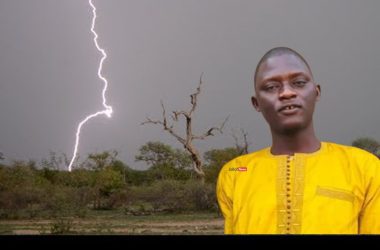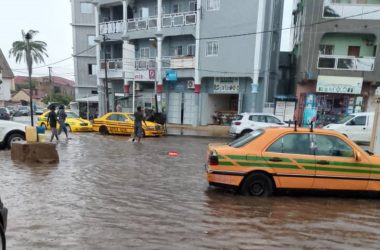
The Gambia’s judiciary is officially calling for former head of state Yahya Jammeh to be prosecuted. It is now up to his successor, Adama Barrow, who has just been re-elected president, to set the legal machine in motion.
His conclusions were eagerly awaited.
On 24 December, Justice Minister Dawda Jallow released the report written by the Truth, Reconciliation and Reparation Commission (TRRC), further tightening the noose around Jammeh.
Even before we started our investigations, we knew that Jammeh, as a leader, was largely responsible for the atrocities committed during that period…But we did not know the extent of the crimes.
The Gambian justice system cited the autocrat, who ruled the country for 22 years after seizing power in a coup, as being responsible for numerous abuses committed during his regime. Among them are several crimes against humanity, for which there is no statute of limitations.
‘The scale of the crimes’
In the report, which was submitted to President Adama Barrow on the eve of the 4 December 2021 presidential election, the TRRC recommends prosecuting Jammeh, who had established an authoritarian system based on terror and impunity.
Alongside nearly 70 people, two of whom are now dead, he is presented as the main perpetrator of certain crimes committed between July 1994 and January 2017. “Even before we started our investigations, we knew that Jammeh, as a leader, was largely responsible for the atrocities committed during that period,” says Baba Galleh Jallow, the TRRC executive-secretary. “But we did not know the extent of the crimes.”
After listening to the testimonies of 393 witnesses, victims and former death squad members, and after two and a half years of investigating, the commission concluded that Jammeh was responsible for extrajudicial detentions, torture and the deaths of oppositionists and journalists. The former president was also found guilty of raping several people, including former beauty queen Fatou ‘Toufah’ Jallow, who had named him in her statement.
It is worrying that soldiers exiled alongside Jammeh in Equatorial Guinea returned just after Adama Barrow was re-elected.
The self-styled ‘development dictator’, who was convinced that he had found a cure for AIDS, was also convicted of the deaths of 41 patients who had been given a fake HIV treatment – violent sexual acts were part of this ‘miracle cure’.
A court based in Dakar?
“If Yahya Jammeh is indeed being prosecuted for crimes against humanity, this means that under the principle of universal jurisdiction, he can be arrested and tried anywhere in the world,” says Jallow.
In its report, the TRRC states that the “best option” would be to create a hybrid court supported by either Ecowas or the African Union and based in Dakar. Not only is Senegal close to The Gambia and therefore to the evidence, but it also hosts the Extraordinary African Chambers, where Chad’s Hissène Habré was both tried and convicted.
According to the commission, such an option “is likely to receive more international support” and carries less risk of instability. “[Jammeh’s] return to Banjul is a real risk for the country. He still has a lot of support here,” says Jallow.
Supporters made their voices heard on the eve of the presidential elections, when the former leader made a comeback onto the Gambian political scene. From Equatorial Guinea, where he has been living in exile since 2017, he spoke out against the electoral agreement between his party and that of his successor. His reaction was so strong that it caused his political party to split. “If Jammeh had been part of this electoral alliance, it would have been more difficult for the executive to implement our recommendations,” says Jallow. “By withdrawing from the agreement, he is making things easier.”
Requests for amnesty
The president and his justice minister are expected to submit a white paper, which will outline their strategy for implementing the TRRC’s recommendations, by 25 May 2022. A Gambian professional and an international expert recruited for the purpose will be part of a task force responsible for drawing up outlines. The TRRC has also submitted a set of recommendations for reforming and strengthening the judiciary and security forces, as well as initiating the reparation process for victims to the president.
Before it can be considered to have finished its work, the commission will have to tackle one last – and thorny – task: to review applications for amnesty from those named in its report.
According to the justice minister, any named individual who has testified before the TRRC “without omitting anything about their responsibility for human rights violations” and “expressed remorse” has two weeks to apply for amnesty. Several applications have already been filed, but those allegedly responsible for crimes against humanity are not, a priori, eligible for such a measure.
Could some of them slip through despite the seriousness of the crimes they have been accused of? In Banjul, all eyes are on Saul Badji, the presidential guard’s former commander and pillar of the former regime. This close friend of Jammeh returned to The Gambia the day after the 4 December presidential election. “It is worrying that soldiers exiled alongside Jammeh in Equatorial Guinea returned just after Adama Barrow was re-elected,” says a source close to the commission, who recalled that Badjie was “directly implicated in several extrajudicial executions, including the brutal murder of two American-Gambian businessmen and the execution of nine prisoners.”
Despite these concerns, the justice community hopes that the colossal work done by the TRRC will set a precedent in transitional justice mechanisms. US lawyer Reed Brody calls it a “historic” model and praises the justice minister’s efforts at “transparency”, as he decided to make the entire report available to the public.
“It took a great deal of preparation and financial support to establish this commission,” says Jallow. “By taking inspiration from other transitional justice mechanisms in the world, we have created a Gambian model that will serve as a landmark.”
Writing by Marième Soumaré
Source: The Africa Report




